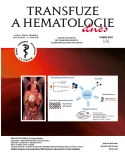-
Medical journals
- Career
Development of Richter´s transformation in a patient with refractory chronic lymphocytic leukaemia on ibrutinib therapy
Authors: L. Smolej 1; M. Šimkovič 1; A. Zavřelová 1; Petra Kašparová 2; P. Hoffmann 3; P. Dvořák 3; M. Slanina 3; E. Krčálová 4; D. Belada 1; P. Žák 1
Authors‘ workplace: Fakultní nemocnice a Lékařská fakulta Univerzity Karlovy, Hradec Králové ; IV. interní hematologická klinika 1; Fingerlandův ústav patologie 2; Radiologická klinika 3; Oddělení nukleární medicíny 4
Published in: Transfuze Hematol. dnes,26, 2020, No. 1, p. 56-58.
Category: Case Reports
Overview
Modern oral inhibitors of B-cell receptor signalling pathways such as ibrutinib and idealise and the bcl-2 inhibitor venetoclax represent effective treatment options in patients with relapsed/refractory chronic lymphocytic leukaemia (CLL). Richter´s transformation (RT, progression of CLL to aggressive lymphoproliferation, most commonly diffuse large B-cell lymphoma, DLBCL) is usually a prognostically highly adverse event with limited treatment options and very short survival, especially when RT occurs on treatment with one of the new inhibitors. We present a case report of RT developing in a 58-year-old CLL patient who relapsed following allogeneic stem cell transplantation treated with ibrutinib. After 11 months on ibrutinib therapy, the patient experienced progression in the form of massive intraabdominal lymphadenopathy. Positron emission tomography/computed tomography (PET/CT) revealed significant hypermetabolism of glucose in the abdominal mass. A needle biopsy was performed and histology confirmed DLBCL. The patient was treated with R-CHOP chemoimmunotherapy and subsequently with R-GD (rituximab, gemcitabine, dexamethasone) because of R-CHOP resistance. However, active anti-lymphoma therapy had to be terminated because of severe thrombocytopenia. The therapeutic approach was changed to symptom management and the patient died in a hospice 2.5 months after diagnosis of RT. In conclusion, this case report demonstrates the extremely unfavourable prognosis of Richter´s syndrome arising on ibrutinib therapy in a patient with advanced CLL.
Keywords:
chronic lymphocytic leukaemia – ibrutinib – Richter´s transformation – Prognosis
Sources
- Munir T, Brown JR, O‘Brien S, et al. Final analysis from RESONATE: Up to six years of follow-up on ibrutinib in patients with previously treated chronic lymphocytic leukemia or small lymphocytic lymphoma. Am J Hematol. 2019;94(12):1353–1363.
- Sharman JP, Coutré ES, Furman RR, et al. Final results of a randomized, phase III study of rituximab with or without idelalisib followed by open-label idelalisib in patients with relapsed chronic lymphocytic leukemia. J Clin Oncol. 2019;37 : 1391–1402.
- Roberts AW, Davids MS, Pagel JM. Targeting BCL2 with venetoclax in relapsed chronic lymphocytic leukemia. N Engl J Med. 2016;374 : 311–322.
- Doubek M, Špaček M, Pospíšilová Š, et al. Doporučení pro diagnostiku a léčbu chronické lymfocytární leukemie (CLL) – 2018. Transfuze Hematol Dnes. 2018;24(3):208–220.
- Parikh SA, Kay NE, Shanafelt TD. How we treat Richter syndrome. Blood. 2014;123(11):1647–1657.
- Ayers EC, Mato AR. Richter‘s transformation in the era of kinase inhibitor therapy: A review. Clin Lymphoma Myeloma Leuk. 2017;17(1):1–6.
- Rossi D, Spina V, Gaidano G. Biology and treatment of Richter syndrome. Blood. 2018;131(25):2761–2772.
- Langerbeins P, Busch R, Anheier N, et al. Poor efficacy and tolerability of R-CHOP in relapsed/refractory chronic lymphocytic leukemia and Richter transformation. Am J Hematol. 2014;89(12):E239–E243.
- Tsimberidou AM, Wierda WG, Wen S, et al. Phase I-II clinical trial of oxaliplatin, fludarabine, cytarabine, and rituximab therapy in aggressive relapsed/refractory chronic lymphocytic leukemia or Richter syndrome. Clin Lymphoma Myeloma Leuk. 2013;13(5):568–574.
- Cclinicaltrials.gov [on-line]. U.S. National Library of Medicine, 2018. Dostupné na: http://clinicaltrials.gov. [Navštíveno 12. 11. 2019]
Labels
Haematology Internal medicine Clinical oncology
Article was published inTransfusion and Haematology Today

2020 Issue 1-
All articles in this issue
- Novinky z redakce
- Editorial
- Richter transformation of chronic lymphocytic leukaemia in the era of treatment with B-cell signalling pathway inhibitors
- Chromosomal aberrations in chronic lymphocytic leukaemia, their prognostic and predictive role
- Chromosomal aberrations and their role in the transformation of chronic lymphocytic leukaemia in the era of BCR inhibitors treatment
- Molecular genetic aberrations in Richter transformation of chronic lymphocytic leukaemia
- Resistance-associated mutations in chronic lymphocytic leukaemia patients treated with ibrutinib, idelalisib and venetoclax
- Development of Richter´s transformation in a patient with refractory chronic lymphocytic leukaemia on ibrutinib therapy
- Transformation of chronic lymphocytic leukaemia into Hodgkin lymphoma
- Vzdělávací workshop – uplatnění nových technologií v precizní medicíně CML a ALL
- Prof. MUDr. Ladislav Jebavý, CSc., slaví 70 let
- Životní jubileum MUDr. Věry Vozobulové
- Transfusion and Haematology Today
- Journal archive
- Current issue
- Online only
- About the journal
Most read in this issue- Chromosomal aberrations in chronic lymphocytic leukaemia, their prognostic and predictive role
- Molecular genetic aberrations in Richter transformation of chronic lymphocytic leukaemia
- Richter transformation of chronic lymphocytic leukaemia in the era of treatment with B-cell signalling pathway inhibitors
- Transformation of chronic lymphocytic leukaemia into Hodgkin lymphoma
Login#ADS_BOTTOM_SCRIPTS#Forgotten passwordEnter the email address that you registered with. We will send you instructions on how to set a new password.
- Career

